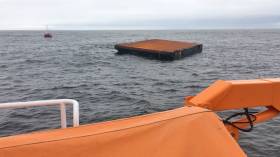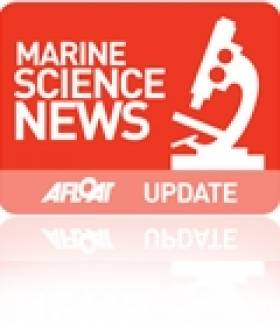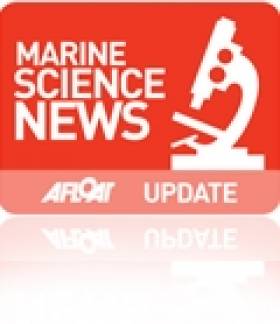Displaying items by tag: Labrador
#RNLI - Ballyglass RNLI’s lifeboat crew had an unusual callout on Monday evening (14 May) when they were launched to recover a runaway barge that had drifted to the Mayo coast across the Atlantic from Canada more than 3,000km away.
The large floating barge had broken from its moorings in Labrador in north-east Canada last November, and after six months at sea was spotted and reported by a passing fishing vessel earlier on Monday.
Ballyglass RNLI received the call to launch last night at 7.20pm. On arriving on scene, the lifeboat crew found a steel barge measuring 26 metres by 16 metres, which was unsecured and floating.
The lifeboat crew established a tow and brought the barge back to Ballyglass Harbour.
However, with no room to berth such a large barge safely, it was put on the lifeboat mooring before a more permanent solution could be found. The crew were not stood down until 2am this morning.
All in all, it took the lifeboat crew seven hours to secure the barge and and bring it safely to Ballyglass.
Commenting on the shout, Ballyglass RNLI lifeboat operations manager Padraic Sheeran said: “We were not expecting this type of callout at all. You do hear of vessels and craft breaking free of moorings but it’s unusual to have one drift thousands of kilometres and have to be rescued by lifeboat.
“On a serious note though, it represented a major navigational danger to any vessel that it collided with and it was a relief to have it safely recovered.”
The callout will remind Afloat.ie readers of the houseboat that drifted from Newfoundland to the Mayo coast in November 2016.
'The Sea: One of Ireland's Greatest Natural Resources' - Coveney
The Minister was speaking during a visit to the Marine Institute's research vessel, RV Celtic Explorer, on its return from a mission to the Labrador and Newfoundland Seas.
He added "I am particularly pleased that this is my first official engagement as Minister for Agriculture, Marine and Food. The work of the RV Celtic Explorer highlights the essential nature of marine research, development and sustainable management, through which Ireland is developing a strong and well-deserved reputation as an emerging centre of excellence, where we have prominent roles in many European and international marine science bodies."
Minister Coveney commended the Marine Institute and its Chief Executive, Dr Peter Heffernan, for its leading and proactive role in the areas of fisheries science, marine environment and food safety as well as ocean science and said that he looked forward to working closely with the Institute and benefitting from the research and advice which they would undertake and provide.
The Minister noted that Ireland's two national research vessels – RV Celtic Explorer and RV Celtic Voyager – will record 267 days at sea during 2011, during which they will be engaged in fisheries surveys, underwater mapping, climate studies and deepwater surveys.
Seeing the capabilities of Ireland's largest research vessel and the work of the Marine Institute, Mr Simon Coveney highlighted the importance the Marine Sector has on the Irish economy. "The seas and ocean that surround the land of Ireland is arguably one of our countries greatest natural resources. Through marine research, development and sustainable management, Ireland is developing a strong reputation as an emerging centre of excellence, where we have prominent roles in many European and international marine science bodies," he said.
Ireland's national research vessels RV Celtic Explorer and RV Celtic Voyager will record 627 days at sea between the two during 2011. Their work will range from fisheries surveys to underwater mapping and from climate studies to deepwater surveys with the remotely operated submersible ROV Holland 1.
"The work conducted on the vessels continues to feed into the success in attracting EU funding to Ireland's marine science programmes that have been achieved by our strategic approach to marine science planning" explained Dr Peter Heffernan, CEO of the Marine Institute.
"The award of funding projects shows that partnerships between academics and small businesses can yield significant dividends in creating jobs, generating economic revenue and the supply of raw materials for new industries ranging from ocean energy and environmental monitoring technologies to marine-inspired pharmaceuticals and food ingredients" he further said.






























































